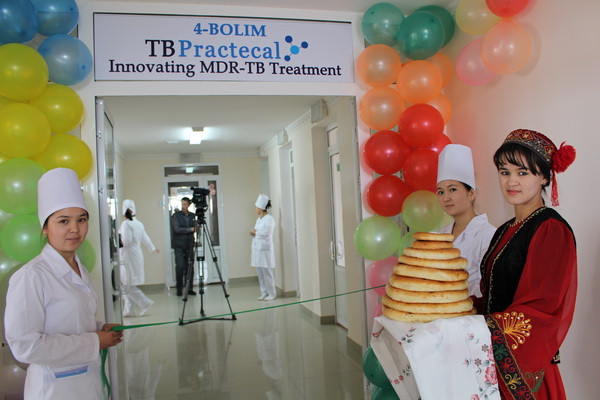
Uzbekistan makes an important contribution to finding the best treatment regimen for drug-resistant tuberculosis
Tashkent, Uzbekistan (UzDaily.com) -- New all-oral regimen lasting just 6 months is safer and more effective for treating multidrug-resistant TB (MDR-TB) than current treatment options for people with drug-resistant TB (DR-TB). This is evidenced by the results of a clinical study published today in the New England Journal of Medicine by Médecins Sans Frontières (MSF).
These data reflect the results of the first ever randomized controlled clinical trial TB-PRACTECAL initiated by Médecins Sans Frontières. A multi-country clinical trial has proven the efficacy and safety of a six-month all-oral TB treatment regimen. Based on these results, WHO recommended a new treatment regimen in the updated Consolidated Guidelines for the Treatment of Multidrug-Resistant Tuberculosis published on 15 December 2022. Uzbekistan has made a huge contribution to achieving these results, which will be life-changing for many people with tuberculosis around the world.
The study has been ongoing since 2017 at seven centers in Belarus, South Africa and Uzbekistan, and ended in March 2021. A total of 552 patients in the world took part in it, 248 of them in Uzbekistan. The clinical trial in the country was carried out in close collaboration with the country’s Ministry of Health in Nukus and Tashkent.
Currently, five countries, with the support of MSF, have begun to introduce new short-term schemes, and almost 400 patients have been admitted for treatment. Eight more countries intend to introduce new schemes in 2023.
"We are delighted that the results of the study are published in the New England Journal of Medicine after a rigorous peer review process," said Burn-Thomas Nyangwa, Medical Director of MSF and Principal Investigator of TB-PRACTECAL. - This publication will provide access to more detailed evidence for both legislative and medical authorities deciding on the implementation of a new treatment regimen, in addition to WHO recommendations. Until relatively recently, for more than 50 years, there have been no new treatments for tuberculosis. Why? Because this disease rarely affects people who have the resources to deal with it. This study was an attempt by MSF to fill this gap. Now it is very important that the new treatment regimen becomes available to everyone who needs it.”
TB-PRACTECAL has tested three drug combinations against country standards of care. All of them were considered to be preferable compared to existing treatment options. However, a six-month regimen of bedaquiline, pretomanid, linezolid, and moxifloxacin (BPaLM) has been shown to be the most effective and safe.
“We started the TB-PRACTECAL clinical trial nine years ago because it was time to do something,” says Burn-Thomas Nyangwa. - Patients have told us that previous treatment regimens are very long, ineffective and exhausting. That the side effects were worse than the disease itself. They really showed lower efficiency: only every second patient was cured. The new BPaLM regimen has an 89% cure rate, is safe, short-term, easier to tolerate, and requires significantly fewer pills to take.”
“When I found out I had TB, I just couldn’t believe it,” says Abdirakhman, a 24-year-old mathematics student from Uzbekistan who had to interrupt his studies when he was diagnosed. “[The DR-TB diagnosis] stunned me. I chose to participate in the TB-PRACTECAL clinical trial and was randomly selected for a shorter, six-month course of treatment. In comparison, the standard course of treatment lasts two years or more. There were difficult moments, as with treatment in general, but it was still better than if I had been treated for two years. I was able to get back to school pretty quickly."
The Phase II/III MSF clinical trial showed that the new reduced regimen of BPaLM was very effective against rifampicin-resistant tuberculosis (RR-TB) and safer than the current standard regimen. 89 percent of patients in the BPaLM group were cured, compared to 52 percent in the standard treatment group, and fewer side effects were reported in the BPaLM group than in the standard treatment group. BPaLC and BPaL also showed significantly better results compared to the standard treatment regimen.
While the new regimen brings hope to the 500,000 people who develop drug-resistant TB each year, the lowest price for a six-month course of BPaLM treatment for the Global Drug Fund (GDF) is about US$600, still above the top price in US$500 called for by Doctors Without Borders. One of the new anti-TB drugs, bedaquiline, developed by Johnson & Johnson with significant government and philanthropic support, sells for US$270 for a six-month course, the lowest price in the world. This is despite the researchers estimating that bedaquiline could be produced and sold for a profit of less than US$102 for a six-month course.
In fact, all three regimens studied in the TB-PRACTECAL clinical trial are very likely to reduce treatment costs compared to the current course of treatment.
“Introducing the shorter, safer, and more effective treatment regimen for BPaLM investigated by TB-PRACTECAL could be life-changing for people with TB. But only if the drugs used in this regimen are available, says Christophe Perrin, TB drug expert at the MSF Access Campaign. - Because significant public funds helped pay for the development of bedaquiline, we are calling on Johnson & Johnson to reduce the price of this drug so that a full course of drug-resistant TB treatment costs no more than US$500 per person. Too many lives have been taken by this disease. People with TB deserve urgent access to shorter, safer and more affordable treatment regimens.”